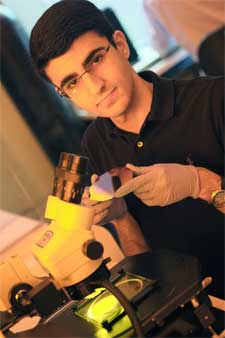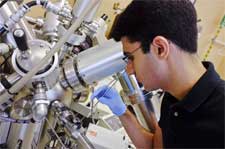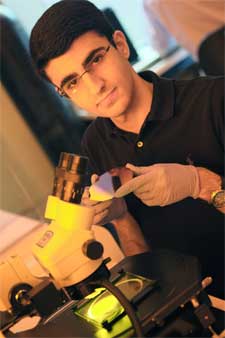 East Greenwich resident earns B.S., M.S. degrees simultaneously
East Greenwich resident earns B.S., M.S. degrees simultaneously
KINGSTON, R.I. – May 31, 2012 – East Greenwich resident Matin Amani completed bachelor’s degrees in electrical engineering and biomedical engineering at the University of Rhode Island last year, and he followed them up with a bachelor’s in chemical engineering and a master’s in electrical engineering this month. Along the way he has made more than a dozen presentations at international engineering conferences and published eight research papers in peer-reviewed scientific journals.
His tremendous research productivity and academic success have earned him the University’s Student Research Excellence Award from the URI Division of Research and Economic Development. The award was presented at a ceremony on May 17.
“Matin is truly one of the most gifted students I have had the pleasure of mentoring,” said Otto Gregory, the URI distinguished professor of chemical engineering who nominated Amani for the award.
“I find research to be fun,” said Amani, 21, who originally wanted to go into medicine but later decided he preferred materials science and electronics. “I especially like it here at URI, where I get the opportunity to go off on my own and figure stuff out and play around with the equipment. It’s just fun.”
 Amani credits Gregory and his 2009 physical metallurgy class for sparking his interest in research. He has been working in Gregory’s lab ever since. His primary research has been a NASA-funded project to harvest energy from the heat from jet engines and use that energy to power sensors to monitor the operation of the engines.
Amani credits Gregory and his 2009 physical metallurgy class for sparking his interest in research. He has been working in Gregory’s lab ever since. His primary research has been a NASA-funded project to harvest energy from the heat from jet engines and use that energy to power sensors to monitor the operation of the engines.
“Gas turbines are a very hot, harsh environment, and you need to take measurements to know what’s going on in the engine,” Amani said. “You typically use wired sensors to characterize the engine after it’s designed, but you can’t use them for in-flight monitoring. So we developed thermoelectric materials that harvest energy from the thermal gradients in the engine and use that to power wireless transmitters to measure the health of the turbine.”
The recent URI graduate also worked with the U.S. Air Force and Mesoscribe Inc., a SUNY Stony Brook start-up company, on a project to embed temperature sensors in plasma sprayed coatings for turbine blades. A third research project involves the development of gas sensors for detecting high explosives in improvised explosive devices commonly used by terrorists.
Amani has presented the results of his research at meetings of the Materials Research Society and the Electrochemical Society, as well as at the International Conference on Advanced Ceramics and Composites, among others.
“The first presentation I went to was the one with the highest attendance, and it was absolutely terrifying,” he said. “And to make it worse, I had to present right after a professor who is famous in my field of research.”
But Amani quickly found that he enjoyed giving scientific presentations. He also found he was good at writing scientific papers. He now has published eight journal articles, with several more in the works.
“It’s sort of like writing a lab report, but it takes a lot longer,” he said. “Every single sentence has to be very carefully thought out. The first one I wrote took forever.”
With three bachelor’s degrees and one master’s degree under his belt, Amani will soon begin work towards a doctorate at Oregon State University, with the aim of eventually becoming a university professor. As part of his doctoral studies, he begins working this summer at the Army Research Lab in Maryland where he will continue his research into portable energy harvesting devices.
URI Department of Communications & Marketing photos by Joe Giblin.

